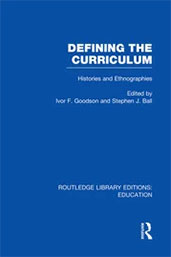Defining the Curriculum: histories and ethnographies
Subjects for Study: towards a social history of curriculum
This article scrutinizes the part which social histories can play in studying the curriculum.[i] The introduction briefly examines the use (misuse or non-use) of historical evidence in some theoretical work. Then by drawing on parts of historical studies, seeks to show, albeit in a limited way, how such work allows hypotheses to be examined and reformulated. By this view, a 'sequence to theory' emerges from historical work which not only extends the range of our studies but which, by posing questions about our current theories, can aid in generating new theories and agendas.
Partly because Knowledge and Control was an influential starting point for my own historical studies I want to examine briefly the use that has been made of history by some of the sociologists who contributed to this volume. I am aware that this is to generalize dangerously from the particular; I am also aware of the excellent past and recent sociological work that has employed historical perspectives, for instance, that of Margaret Archer.
Nonetheless, I think the example will establish some general points, especially as Young and Bernstein have, since Knowledge and Control, come to argue for historical work. Young has said that 'one crucial way of reformulating and transcending the limits within which we work, is to see, how such limits are not given or fixed, but produced through the conflicting actions and interests of man in history' (Young, 1977, pp. 248-9). Likewise Bernstein has argued that 'if we are to take shifts in the content of education seriously, then we require histories of these contents, and their relationships to institutions and symbolic arrangements external to the school' (Bernstein, in Rex, 1974, p. 156).
In practice, however, much of the work of these sociologists to date can be characterized in two ways: either (1) history is not used; or, alternatively, (2) history is misused, or to use Silver's elegant phrase 'raided' (Silver, 1977, p. 17). Much of the work actually ignores historical background; no evolutionary historical process is provided. Studies develop, so to speak, horizontally, working out from theories of social structure and the social order. When historical evidence is presented it is provided as a snapshot tram the past to prove a contemporary point.
[i] This paper was presented at the Conference on School Subjects: Histories and Ethnographics, St Hilda's College, Oxford, September 1982 and in modified version appeared in the Journal of Curriculum Studies, December 1983.
